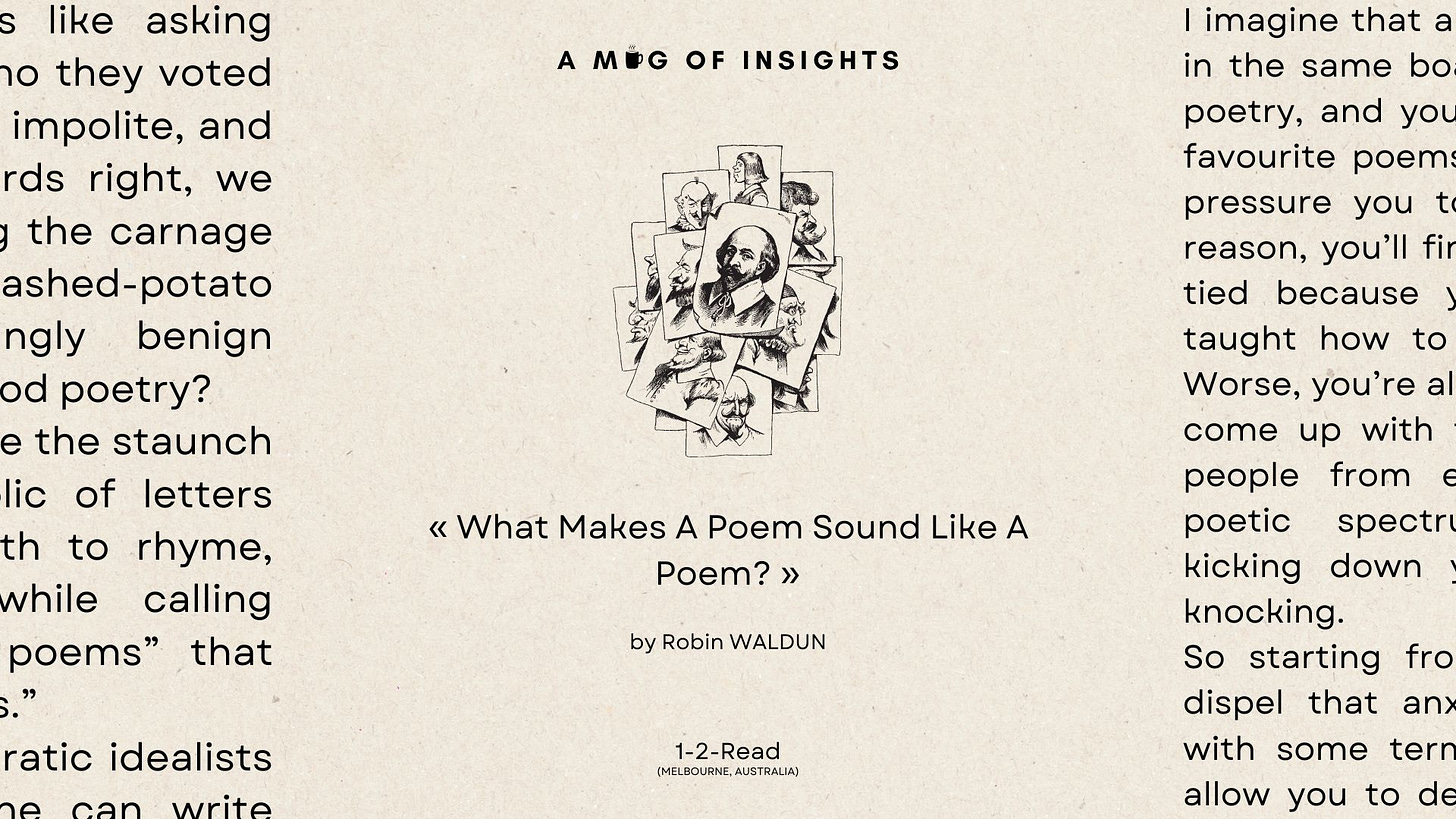[1-2-Read] What Makes A Poem Sound Like A Poem?
Giving away my English Degree pt. 2
This is another repost of the 1-2-Read newsletter for paid subscribers, where we tackle 1 big idea and give you 2 journaling prompts to strengthen your literacy skills. Your support is the reason why I’m able to offer any value on this platform, and thank you so much for being here.
(1) The Idea: Demystifying Poetic Meter & Form
Talking about poetry is like asking people in a lunch line who they voted for. Granted, it’s horribly impolite, and if we don’t play our cards right, we might end up witnessing the carnage of flipped tables and mashed-potato stains over a seemingly benign question: what makes good poetry?
On the one hand, we have the staunch members of the republic of letters who swore a blood oath to rhyme, meter, and conceit while calling everything else “slack poems” that read like “untucked shirts.”
And we have the democratic idealists who believe that anyone can write poetry. All you need to do is write a sentence, break it into verse, sprinkle something vaguely political in there, and voilà! Poetry.
For me, watching this feud is like witnessing the political infighting of another country or watching a fight break out in a pub I don’t visit. I stumbled upon poetry quite late, and hearing people rant about poetry is like getting caught up in a discussion about an 80s band I’ve never heard of.
I imagine that a lot of you guys are in the same boat. You’ve heard of poetry, and you might have a few favourite poems. But when people pressure you to come up with a reason, you’ll find yourself tongue-tied because you’ve never been taught how to describe a poem. Worse, you’re also afraid that if you come up with the wrong answer, people from either end of the poetic spectrum might come kicking down your door without knocking.
So starting from this week, let’s dispel that anxiety and arm you with some terminologies that will allow you to defend why you love what you love without feeling pressured into either end of the poetic spectrum.
Preamble: Deceptive Simplicity
Poems look deceptively simple. A few verses, some rhymes and a palpable message that will leave you nodding or clicking your fingers. But if you’ve ever cornered a poet and forced them to empty their pockets, they’ll all tell you that it’s never as simple as channelling divine inspiration.
A few weeks ago, I sat down with
from when she was visiting Melbourne and launched into a weekend-long chat about the craft of poetry. The lesson I took away from her is that though poems might all look the same on the page, what distinguishes a crap poem from a good one is how much attention poets put behind the deceptively simple form.Some poems punch us in the gut straight away. We think to ourselves: “Oh shit, it’s so true!” right after reading it but the impact is as short-lived as the initial punch. There’s nothing to dig our heels into because the imagery is immediate and reeks of meaningless platitudes. This isn’t to say that these are examples of bad poetry, but they certainly permit no lingering.
Other poems suffer from a different issue. Though they are substantial, rich in imagery and allusions, they all leave the reader scratching their heads. Did I read this right? Am I stupid? What if all this is just nonsense? And if these poems fall into the wrong pompous hands of those who pretend to understand them, they’ll be hailed as masterpieces or used as ammunition to demonise everything else.
The trick here, if you want to be a demanding reader, is to refuse to side with either end of these extremes. Just because a poem looks simple doesn’t mean it lacks layered meanings, and also, not all elaborate poems have a lot to say. An impressive poem usually finds a careful balance between intense themes and simplistic language, giving us the impression that behind the clean shop fronts, staffers are working tirelessly around the clock to uphold the balance.
As careful readers, it’s our job to go beyond window shopping, enter the store and have a nice chat with the people who keep the place running. And this week, let me introduce you to two of my favourite staff members in the retail business of poetry: meter and form.
Can You Hear The Difference?
Keep reading with a 7-day free trial
Subscribe to A Mug of Insights to keep reading this post and get 7 days of free access to the full post archives.



